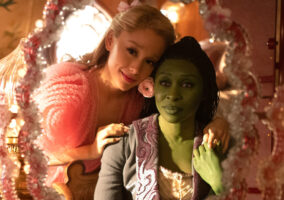As per usual with the theme-heavy scripts of Boardwalk Empire, stray bits of dialogue reveal the larger story. As Eli says to Nucky when it becomes clear that the noose is tightening and he’s holding the other end, “Nobody takes power. Somebody else has to give it to them. Look around , big brother. What do you got?” And earlier, as Al Rothstein asks Jimmy, “Who are you, Mr. Darmody?” This episode is about both the nature of power (and how it’s both elusive and illusory) but it’s also about the characters asking themselves who they really are in this world of shifting power.
, big brother. What do you got?” And earlier, as Al Rothstein asks Jimmy, “Who are you, Mr. Darmody?” This episode is about both the nature of power (and how it’s both elusive and illusory) but it’s also about the characters asking themselves who they really are in this world of shifting power.
Nucky and Chalky both wind up in a jail cell together, a situation devised to humiliate the former since a white man of his social standing would never normally share a cell with a black man. Both men know this and both men are furious about it for different reasons. Nucky has the kind of power (economic, political, and most importantly, social) that gets him out of that jail cell fairly quickly. Chalky on the other hand, has a far more, you’ll forgive the term, tribal power; one that may not manifest itself in social standing or even in literacy, but that allows him to call upon his brothers to fight his battles simply by mentioning their names. It’s an awesome and frightening power that leaves his tormenter broken and bleeding on the floor without him having to do much more than raise an eyebrow. Even in a jail cell, Chalky is a force to be reckoned with.
But Nucky is less of one and he feels that power slipping away. His wisecracking ways with the press fail him and they turn on him, which leaves him flustered and frustrated. Most of his associates, the people he says he spent his life keeping “satisfied,” aren’t satisfied at all, he finds out, and don’t feel like paying the piper anymore. The ward bosses and the Commodore turning on him he can handle. It’s almost expected in a lot of ways. But having Eli and Jimmy switch sides is deeply painful to him, n ot just because of the betrayal, but because he has to destroy them both for making the attempt. “I will help you if you tell me now,” he says to Eli, “Because in a minute it will be too late.” Even with his power slipping away from him, we have no doubt he will follow up on that threat.
ot just because of the betrayal, but because he has to destroy them both for making the attempt. “I will help you if you tell me now,” he says to Eli, “Because in a minute it will be too late.” Even with his power slipping away from him, we have no doubt he will follow up on that threat.
Mr McGarrigle of Sinn Fein is also seeking power. Back home, he already has the political kind of power; the kind that allows him to move large groups of people in the direction he wants them to go, but he’s in America seeking out a more prosaic form of it: guns and money to continue the fight against his English oppressors. Nucky’s political power might be fading, but that’s still something he can dole out without thinking about it too much. McGarrigle knows who he is and exactly what he wants. In fact, his rigidity and self-knowledge tends to set him apart from all of these Americans who don’t seem to know who they are or what they want. He’s befuddled and annoyed with the country and wants to get out as soon as possible; to get back to the world where he doesn’t have to question himself because he’s absolutely sure of the rightness of his cause. The only person who manages to gain a little respect from him is Margaret, who cuts him off from insulting her by telling him firmly “I know where I came from and I know who I am.” She’s not the meek Irish girl, the little “colleen” that both McGarrigle and his man Slater first assume she is.
And to illustrate this point rather brilliantly, Margaret borrows clothes from her maid and shows up at Nucky’s office looking like… well just like she did last year when she first went to Nucky for help. It’s an amazingly self-aware moment, and a somewhat  frightening demonstration of just how smart she is and how dangerous she can be when she applies that intelligence. In fact, it’s interesting to note that the people in this tale most self-assured and thus, most secure in their power, are the ones who are, for lack of a better word, downtrodden and fighting against their oppressors: Chalky, Margaret, and McGarrigle.
frightening demonstration of just how smart she is and how dangerous she can be when she applies that intelligence. In fact, it’s interesting to note that the people in this tale most self-assured and thus, most secure in their power, are the ones who are, for lack of a better word, downtrodden and fighting against their oppressors: Chalky, Margaret, and McGarrigle.
As for Jimmy, he’s the loose cannon in this tale. Ostensibly on the side of the Commodore, it’s more accurate to say he has an allegiance to only one person: himself. Neither Nucky nor the Commodore totally trust him and with good reason. While the two father figures in his life battle it out, he’s off making his own deals with Lucky Luciano and Meyer Lansky, signaling a younger generation of gangsters that will be far cruder and leave a far bloodier trail in their wakes than the ward bosses and politics methods of their parent figures. If Jimmy doesn’t know who he is yet it’s because he can’t quite admit it. He can put on the cravat but he’ll always be the “brigand in the woods,” the supremely talented killing machine always trying to walk away from an ever-growing pile of bodies.
“We’ll Always Have Paris” Next Post:
Doctor Who, Terra Nova, and Homeland
Please review our Community Guidelines before posting a comment. Thank you!



